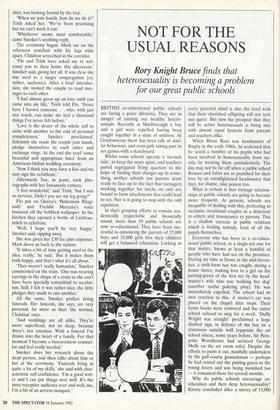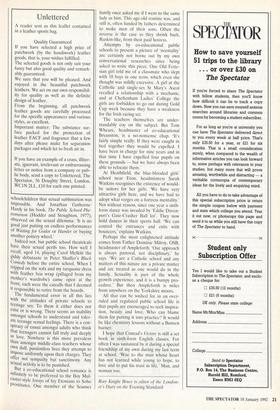NOT FOR THE USUAL REASONS
Rory Knight Bruce finds that
heterosexuality is becoming a problem for our great public schools
BRITISH co-educational public schools are facing a grave dilemma. They are in danger of turning out healthy hetero- sexuals. Recently at Marlborough a boy and a girl were expelled having been caught together in a state of undress. At Gordonstoun there has been talk of simi- lar behaviour, and even girls taking part in sex games with a skateboard.
Whilst some schools operate a 'six-inch rule', to keep the sexes apart, and teachers patrol segregated living quarters in the hope of finding their charges up to some- thing, neither schools nor parents seem ready to face up to the fact that teenagers working together for weeks on end are bound to form attachments that could lead to sex. Nor is it going to stop with the odd expulsion.
In their grasping efforts to remain aca- demically respectable and financially sound, more than 50 public schools are now co-educational. They have been suc- cessful in convincing the parents of 57,000 boys and 33,000 girls that their children will get a balanced education. Lurking in every parental mind is also the fond wish that their cherished offspring will not turn out queer. But now the prospect that they will be active heterosexuals is being met with almost equal hysteria from parents and teachers alike.
When Brian Rees was headmaster of Rugby in the early 1980s, he reckoned that he saved a number of his pupils who had been involved in homosexuality from sui- cide by treating them unvindictively. The day may not be far off when a public school Romeo and Juliet are so punished for their love by an unenlightened headmaster that they, for shame, take poison too.
What is certain is that teenage relation- ships in public schools are going to become more frequent. At present, schools arc incapable of dealing with this, preferring to victimise occasional couples as a deterrent to others and reassurance to parents. This is a shallow exercise in public relations which is fooling nobody, least of all the pupils themselves.
Everyone who has been to a co-educa- tional public school, or a single-sex one for that matter, knows at least a handful of people who have had sex on the premises. During my time at Stowe in the mid-Seven- ties, a sixth-form boy was caught, during a house dance, making love to a girl on the putting-green of the first tee by the head- master's wife who was 'walking her dog' (another useful policing ploy). He was immediately expelled. The school had its own reaction to this. A master's car was placed on the chapel altar steps. Their hymn books were removed and the entire school refused to sing for a week. 'Duffy Wright was straight' proclaimed a large daubed sign, in defence of the boy on a classroom outside wall (opposite the art school where, some years before, Sir Pere- grine Worsthorne had seduced George Melly on the art room sofa). Despite the efforts to paint it out, manfully undertaken by the golf-course groundsman — perhaps he had rented out the putting-green to the young lovers and was being punished too — it remained there for several months.
Why do public schools encourage co- education and then deny heterosexuality? Kinsey concluded after a survey of 13,000
schoolchildren that sexual sublimation was impossible. And Jonathan Gathorne- Hardy in his book, The Public School Phe- nomenon (Hodder and Stoughton, 1977), observed on the sexual dilemma: `It is no good just putting on endless performances of Waiting for Godot or Hamlet or buying another pottery wheel.'
Indeed not, but public school theatricals have their sexual perils too. How well I recall, aged 14, playing Carol Melkitt the
giddy debutante in Peter Shaffer's Black Comedy before the entire school. When I
tripped on the sofa and my turquoise dress with feather boa wrap (pillaged from my mother's wardrobe) came open at the front, such were the catcalls that I deemed it responsible to retire from the hoards.
The fundamental error in all this lies with the attitudes of private schools to teenage sex. To them it either does not exist or is wrong. There seems an inability amongst schools to understand and toler- ate teenage sexual feelings. There is a con- spiracy of ennui amongst adults who think that teenagers cannot fall truly and deeply in love. Nowhere is this more prevalent than amongst middle-class teachers whose own dull, passionless lives they attempt to impose uniformly upon their charges. They offer not sympathy but sanctimony. Any sexual activity is to be punished. •
But a co-educational school romance is infinitely to be preferred to the Boy Mul-• caster-style forays of fey Etonians to Soho prostitutes. One member of the Soames
family once asked me if I went to the same lady as him. This age-old routine was, and still is, often funded by fathers determined to make men of their sons. Often the reverse is the case as they shrink hack, Ruskin-like, from their paid hostess.
Attempts by co-educational public schools to present a picture of 'normality' are certainly not borne out by my own conversational researches since being asked to write this piece. One Old Fette- sian girl told me of a classmate who slept with 18 boys in one term, which even she thought was mildly excessive. A girl at the Catholic and single-sex St Mary's Ascot recalled a relationship with a mechanic, and at Cheltenham Ladies' College the girls are forbidden to go out during Gold Cup week because they have a weakness for the Irish racing set.
The teachers themselves are under- standably coy on the subject. But Tom Wheare, headmaster of co-educational Bryanston, is a no-nonsense chap. 'It's fairly simple really. If they were caught in bed together they would be expelled. I have been in charge for nine years and in that time I have expelled four pupils on these grounds — but we have always been able to relocate them.'
At Heathfield, the blue-blooded girls' school near Eton, headmistress Sarah Watkins recognises the existence of would- be suitors for her girls: 'We have very attractive girls here, and we have had to adopt what verges on a fortress mentality.'
Not without reason, since one year a sixth- form dance was invaded by 'Eddie Daven- port's Gate-Crasher Ball lot'. They now hold dances in their sports hall. 'We can control the entrances and exits with bouncers,' explains Watkins.
Perhaps the most enlightened attitude comes from Father Dominic Milroy, OSB, headmaster of Ampleforth. 'Our approach is always pastoral, not disciplinary,' he says. 'We are a Catholic school and any matters of this nature are a private matter and are treated as one would do in the family. Sexuality is part of the whole growth experience, and it is a bumpy pro- cedure.' But then Ampleforth is miles from anywhere on the Yorkshire moors.
All that can be wished for in an over- ruled and regulated public school life is that pupils are encouraged to seek inspira- tion, beauty and love. Who can blame them for putting it into practice'? It would he like chemistry lessons without a Bunsen burner.
I hope that Conrad's Victory is still a set book in sixth-form English classes. For
often I was sustained by it during a special
friendship of my own during my last term at school. 'Woe to the man whose heart
has not learned while young to hope, to love and to put his trust in life,' Man, and woman too.
Ron. Knight Bruce is editor of the London- er's Dian• on the Evening Standard



















































 Previous page
Previous page